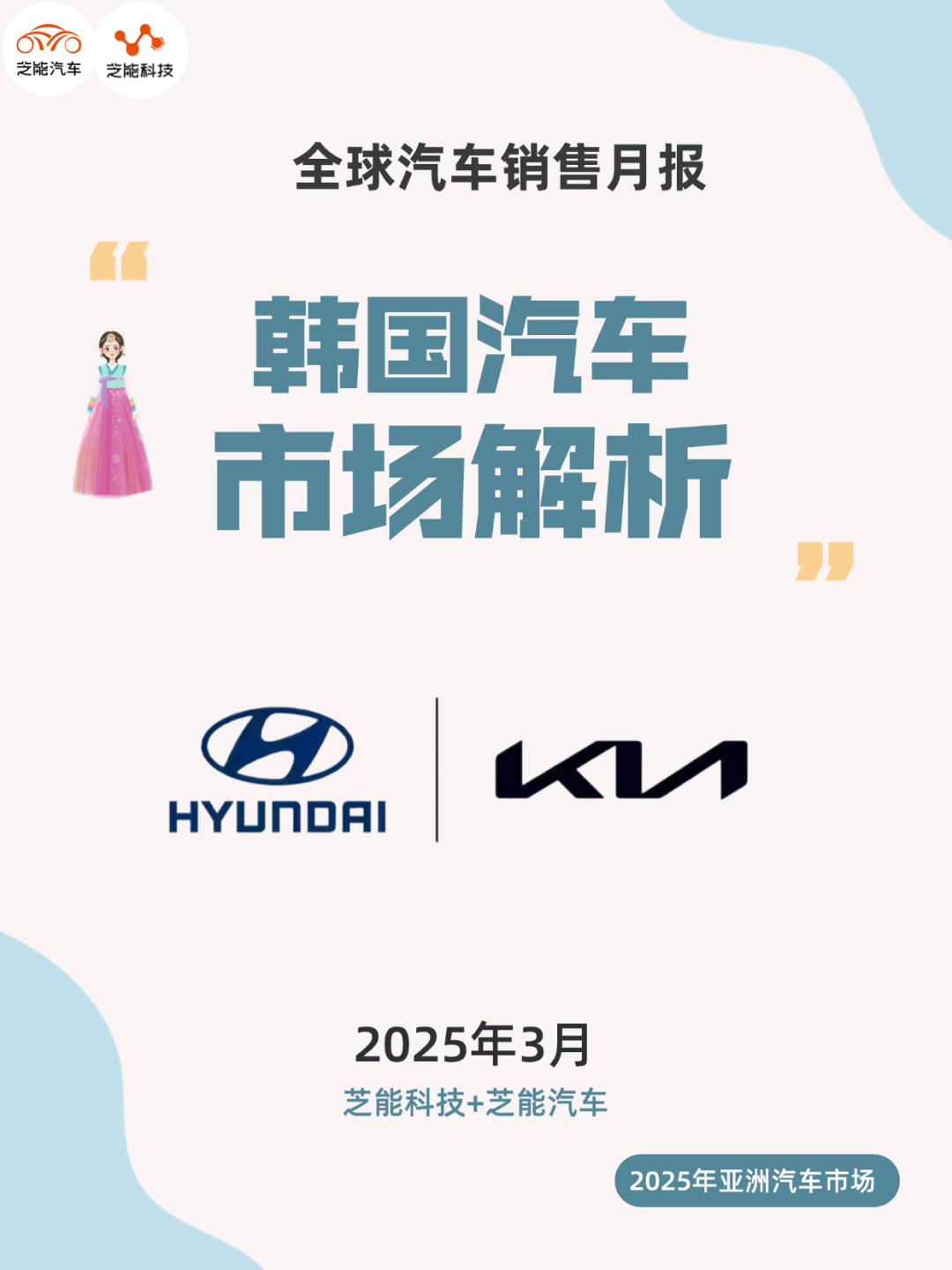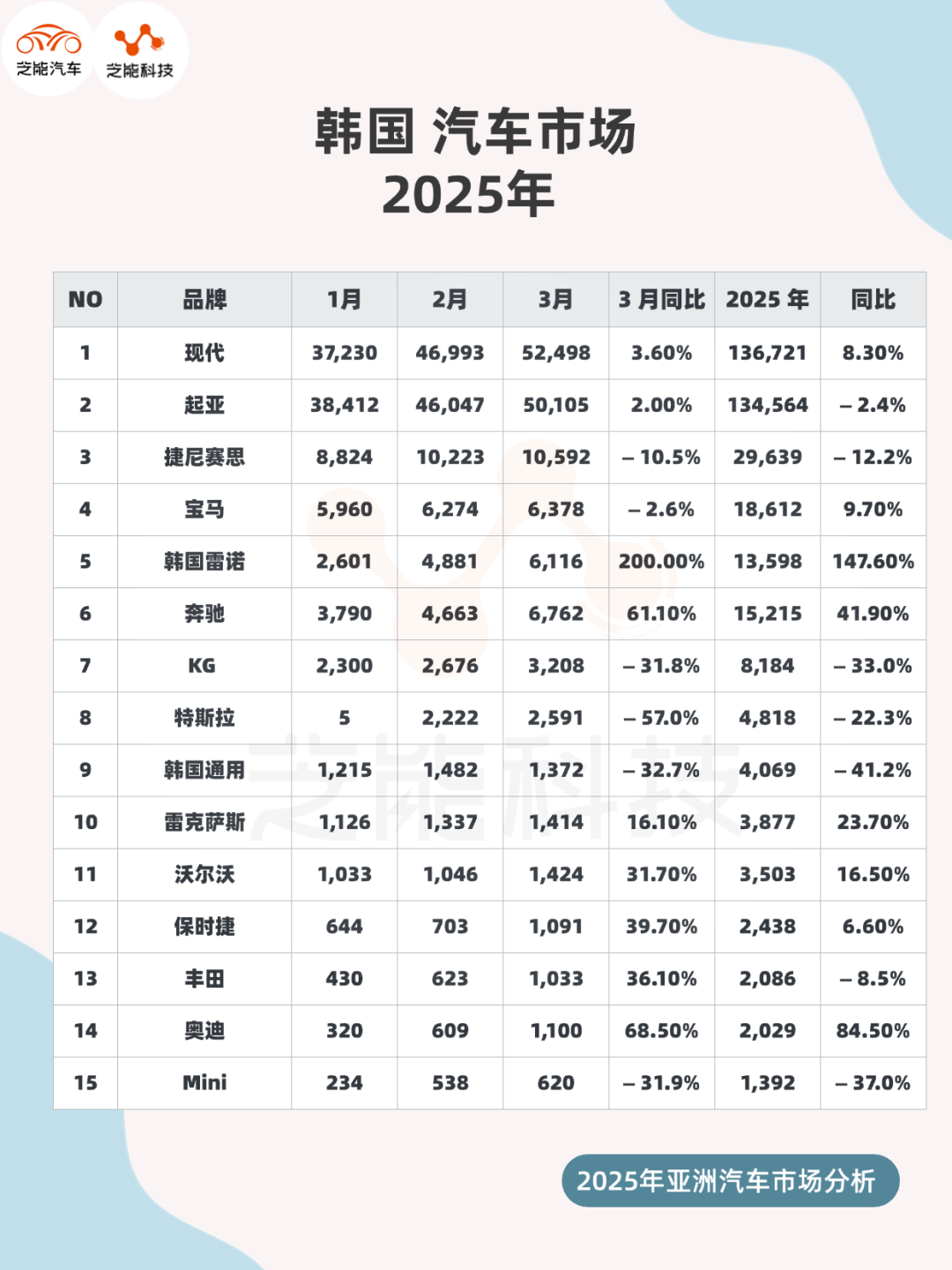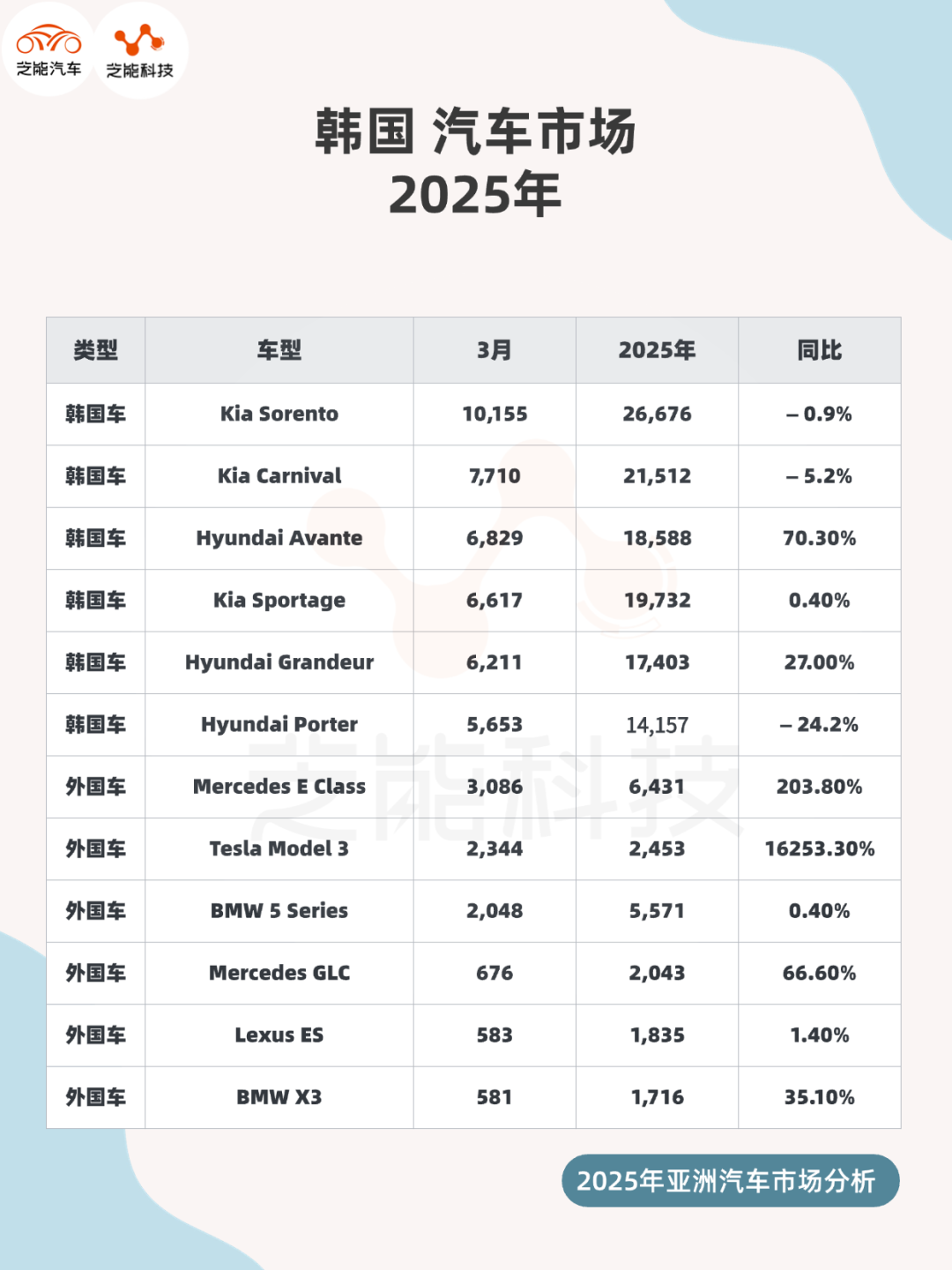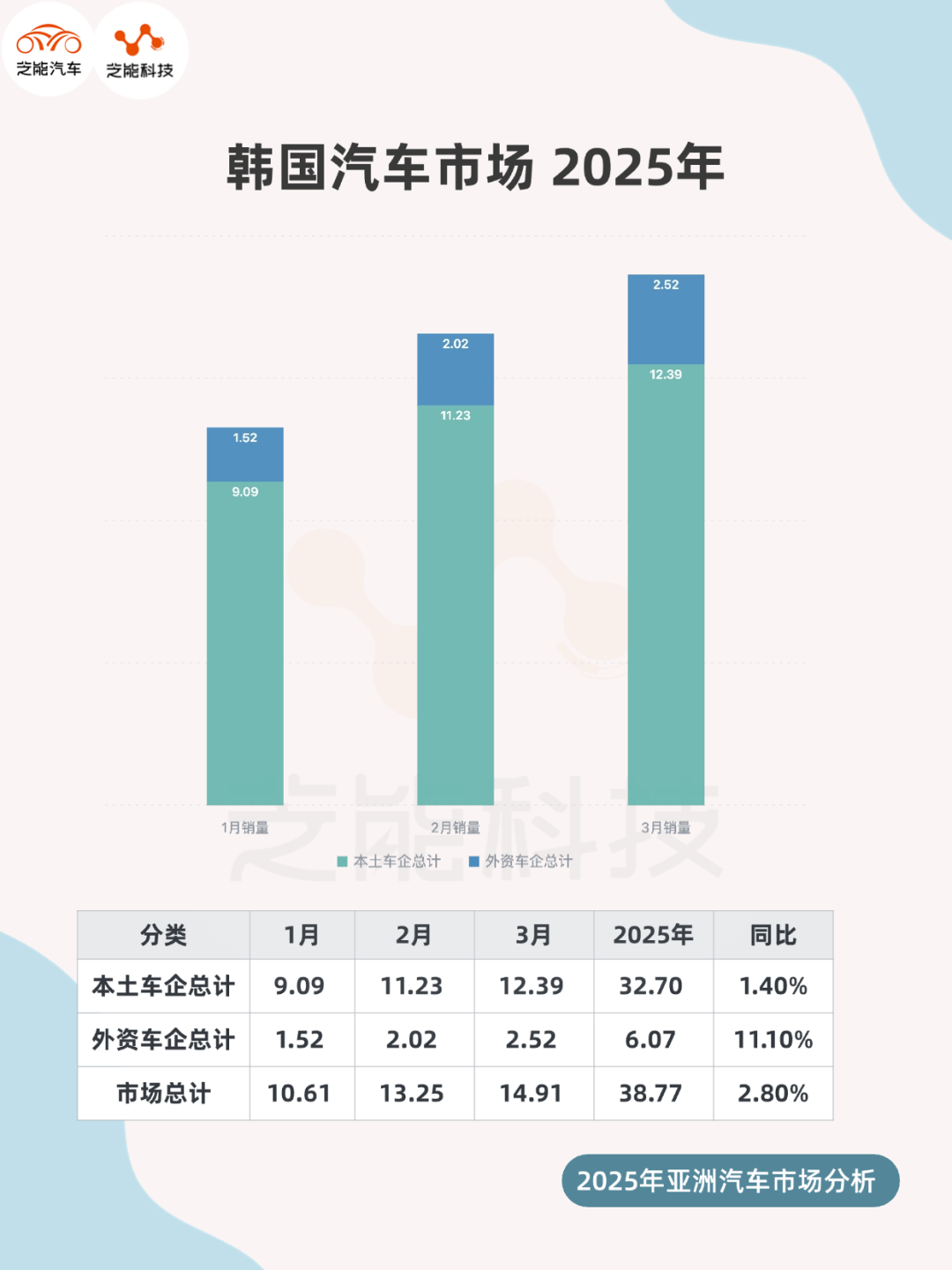Asian Auto Market | South Korea March 2025: Hyundai and Kia Lead, BYD Makes Debut
![]() 04/14 2025
04/14 2025
![]() 422
422

In March 2025, South Korea's new car market expanded by 2.4% year-on-year, with sales totaling 149,120 units.
● Brand Performance
◎ Hyundai Motor reclaimed the top spot, capturing a 35.2% market share, followed closely by Kia with 33.6%.
◎ Among foreign brands, Mercedes-Benz achieved a 61.1% sales surge, outpacing BMW to reclaim the lead among non-domestic competitors.
◎ Chinese brand BYD made its debut in the South Korean market, recording an initial sales volume of 10 units, marking a significant step in its global expansion strategy.
● Model Performance
◎ The Kia Sorento retained its sales crown for the seventh consecutive month.
◎ Sales of the Hyundai Avante and Tesla Model 3 surged, indicating a growing preference for local brands and electric vehicles among consumers.
This article, curated by Zhineng Technology, delves into the latest dynamics of the South Korean auto market, encompassing a market overview, brand sales, and model competition.
01
Overview of Sales in the South Korean Auto Market
● In March 2025, new car sales in South Korea reached 149,120 units, marking a 2.4% year-on-year increase. Local manufacturers sold 123,891 units, up 2.9%, while foreign manufacturers sold 25,229 units, experiencing a slight decline of 0.1%.
● Cumulative sales for the first quarter amounted to 387,702 units, an increase of 2.8% year-on-year. Local manufacturers accounted for 327,045 units (+1.4%), while foreign manufacturers contributed 60,657 units (+11.1%).
Market growth in South Korea is primarily fueled by the robust performance of local brands and the rapid penetration of foreign brands in the premium and electric vehicle segments.
● Sales Performance of Different Brands

Here are the sales figures and market shares of major brands in the South Korean market in March 2025:
◎ Hyundai: Sold 52,498 units, up 3.6% year-on-year, with a 35.2% market share, firmly holding the top position.
◎ Kia: Sold 50,105 units, up 2.0% year-on-year, with a 33.6% market share, ranking second.
◎ Genesis: Sold 10,592 units, down 10.5% year-on-year, with a 7.1% market share.
◎ Mercedes-Benz: Sold 6,762 units, up 61.1% year-on-year, with a 4.5% market share, leading among foreign brands.
◎ BMW: Sold 6,378 units, down 2.6% year-on-year, with a 4.3% market share.
◎ Renault Korea: Sold 6,116 units, up 200.0% year-on-year, with a 4.1% market share.
◎ KG: Sold 3,208 units, down 31.8% year-on-year, with a 2.2% market share.
◎ Tesla: Sold 2,591 units, down 57.0% year-on-year, with a 1.7% market share.
◎ Volvo: Sold 1,424 units, up 31.7% year-on-year, with a 1.0% market share.
◎ Lexus: Sold 1,414 units, up 16.1% year-on-year, with a 0.9% market share.
● Local brands Hyundai and Kia continue to dominate the market, together accounting for a 68.8% share, underscoring the strong competitiveness of South Korean automakers.
● Among foreign brands, Mercedes-Benz stands out with its robust growth, while Renault Korea's 200% increase highlights its successful localization strategies. Despite an overall decline in sales, Tesla's specific models have performed impressively (details below).
● The performance of Chinese brands in the South Korean market is closely monitored. In March 2025, BYD officially entered the market with an initial sales volume of 10 units.
As a highly developed automotive market, BYD's entry not only diversifies consumer choices but also paves the way for potential sales breakthroughs in South Korea as its product line expands and brand recognition increases.
02
Analysis of Model Sales and Competitive Landscape
Here are the sales data for major models in the South Korean market in March 2025:

● Local Models:
◎ Kia Sorento: Sold 10,155 units, up 13.2% year-on-year, maintaining the top spot for the seventh consecutive month.
◎ Kia Carnival: Sold 7,710 units, up 0.9% year-on-year.
◎ Hyundai Avante: Sold 6,829 units, up 63.1% year-on-year.
◎ Kia Sportage: Sold 6,617 units, down 1.8% year-on-year.
◎ Hyundai Grandeur: Sold 6,211 units, up 1.8% year-on-year.
◎ Hyundai Porter: Sold 5,653 units, down 29.6% year-on-year.
● Foreign Models:
◎ Mercedes-Benz E-Class: Sold 3,086 units, up 511.1% year-on-year, reclaiming the top foreign model spot.
◎ Tesla Model 3: Sold 2,344 units, up 15,526.7% year-on-year, jumping to second place.
◎ BMW 5 Series: Sold 2,048 units, down 9.5% year-on-year.
◎ Mercedes-Benz GLC: Sold 676 units, up 6.1% year-on-year.
◎ Lexus ES: Sold 583 units, down 29.1% year-on-year.
◎ BMW X3: Sold 581 units, up 38.0% year-on-year.
Kia's new Tasman pickup truck debuted on the domestic sales ranking, though specific sales figures were not disclosed. Its introduction further strengthens Kia's presence in the pickup truck market.

● The South Korean auto market presents a competitive landscape characterized by the dominance of local brands and the accelerated penetration of foreign brands:
◎ Local Brands: Hyundai and Kia continue to lead the market. The enduring popularity of the Kia Sorento reflects consumers' preference for mid-to-large SUVs, while the 63.1% growth of the Hyundai Avante signals a resurgence in sedan market demand. The launch of the Kia Tasman further enriches the product portfolio, potentially unlocking new growth avenues in both commercial and personal markets.
◎ Foreign Brands: Mercedes-Benz has solidified its position in the luxury car market with strong performances from the E-Class and GLC. Tesla Model 3's astonishing 15,526.7% increase, despite the overall decline in brand sales, underscores the burgeoning potential of the electric vehicle segment. BMW and Lexus have shown mixed performances, with some models experiencing slower growth.
◎ Chinese Brands: BYD's initial sales of 10 units may seem modest, but its technological edge in electric vehicles provides a solid foundation for its foothold in the South Korean market. Zhineng Technology believes that with the intensifying trends of electrification and intelligence, BYD may gradually gain market share through pricing strategies and product innovation.
Overall, the competitive landscape in the South Korean market is diversifying, with local brands maintaining their stronghold while foreign brands strive for premiumization and electrification.
Conclusion
In March 2025, the South Korean auto market sustained its growth trajectory, led by Hyundai and Kia. The enduring success of the Kia Sorento and the rising popularity of the Hyundai Avante underscored the strength of local brands. The impressive performances of Mercedes-Benz and the Tesla Model 3 reflected the competitiveness of foreign brands in the luxury and electric vehicle segments, while BYD's debut marked a new chapter in the globalization journey of Chinese automakers.






